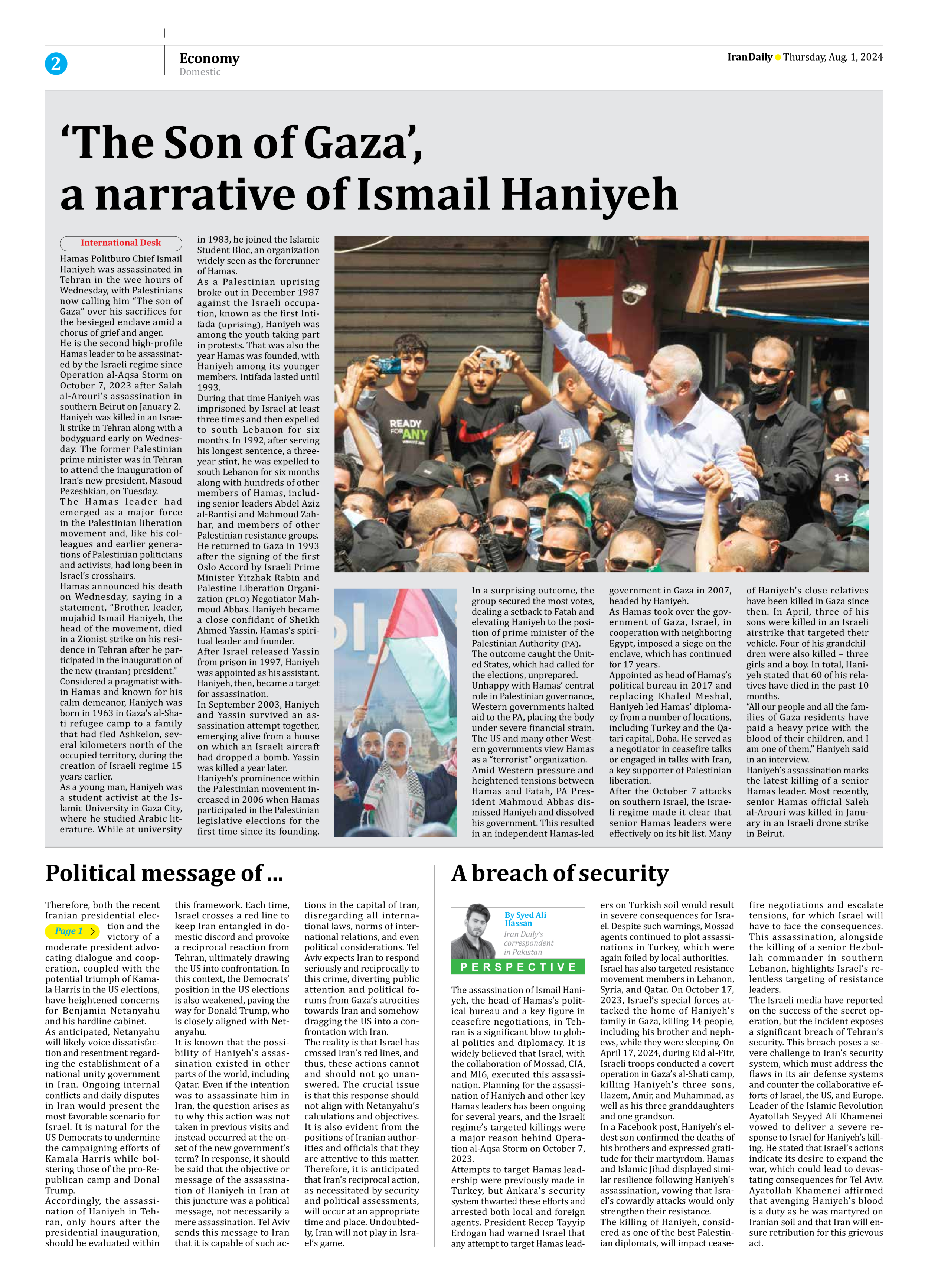
Copy in clipboard...
‘The Son of Gaza’, a narrative of Ismail Haniyeh
He is the second high-profile Hamas leader to be assassinated by the Israeli regime since Operation al-Aqsa Storm on October 7, 2023 after Salah al-Arouri’s assassination in southern Beirut on January 2.
Haniyeh was killed in an Israeli strike in Tehran along with a bodyguard early on Wednesday. The former Palestinian prime minister was in Tehran to attend the inauguration of Iran’s new president, Masoud Pezeshkian, on Tuesday.
The Hamas leader had emerged as a major force in the Palestinian liberation movement and, like his colleagues and earlier generations of Palestinian politicians and activists, had long been in Israel’s crosshairs.
Hamas announced his death on Wednesday, saying in a statement, “Brother, leader, mujahid Ismail Haniyeh, the head of the movement, died in a Zionist strike on his residence in Tehran after he participated in the inauguration of the new (Iranian) president.”
Considered a pragmatist within Hamas and known for his calm demeanor, Haniyeh was born in 1963 in Gaza’s al-Shati refugee camp to a family that had fled Ashkelon, several kilometers north of the occupied territory, during the creation of Israeli regime 15 years earlier.
As a young man, Haniyeh was a student activist at the Islamic University in Gaza City, where he studied Arabic literature. While at university in 1983, he joined the Islamic Student Bloc, an organization widely seen as the forerunner of Hamas.
As a Palestinian uprising broke out in December 1987 against the Israeli occupation, known as the first Intifada (uprising), Haniyeh was among the youth taking part in protests. That was also the year Hamas was founded, with Haniyeh among its younger members. Intifada lasted until 1993.
During that time Haniyeh was imprisoned by Israel at least three times and then expelled to south Lebanon for six months. In 1992, after serving his longest sentence, a three-year stint, he was expelled to south Lebanon for six months along with hundreds of other members of Hamas, including senior leaders Abdel Aziz al-Rantisi and Mahmoud Zahhar, and members of other Palestinian resistance groups.
He returned to Gaza in 1993 after the signing of the first Oslo Accord by Israeli Prime Minister Yitzhak Rabin and Palestine Liberation Organization (PLO) Negotiator Mahmoud Abbas. Haniyeh became a close confidant of Sheikh Ahmed Yassin, Hamas’s spiritual leader and founder.
After Israel released Yassin from prison in 1997, Haniyeh was appointed as his assistant. Haniyeh, then, became a target for assassination.
In September 2003, Haniyeh and Yassin survived an assassination attempt together, emerging alive from a house on which an Israeli aircraft had dropped a bomb. Yassin was killed a year later.
Haniyeh’s prominence within the Palestinian movement increased in 2006 when Hamas participated in the Palestinian legislative elections for the first time since its founding. In a surprising outcome, the group secured the most votes, dealing a setback to Fatah and elevating Haniyeh to the position of prime minister of the Palestinian Authority (PA).
The outcome caught the United States, which had called for the elections, unprepared.
Unhappy with Hamas’ central role in Palestinian governance, Western governments halted aid to the PA, placing the body under severe financial strain. The US and many other Western governments view Hamas as a “terrorist” organization.
Amid Western pressure and heightened tensions between Hamas and Fatah, PA President Mahmoud Abbas dismissed Haniyeh and dissolved his government. This resulted in an independent Hamas-led government in Gaza in 2007, headed by Haniyeh.
As Hamas took over the government of Gaza, Israel, in cooperation with neighboring Egypt, imposed a siege on the enclave, which has continued for 17 years.
Appointed as head of Hamas’s political bureau in 2017 and replacing Khaled Meshal, Haniyeh led Hamas’ diplomacy from a number of locations, including Turkey and the Qatari capital, Doha. He served as a negotiator in ceasefire talks or engaged in talks with Iran, a key supporter of Palestinian liberation.
After the October 7 attacks on southern Israel, the Israeli regime made it clear that senior Hamas leaders were effectively on its hit list. Many of Haniyeh’s close relatives have been killed in Gaza since then. In April, three of his sons were killed in an Israeli airstrike that targeted their vehicle. Four of his grandchildren were also killed – three girls and a boy. In total, Haniyeh stated that 60 of his relatives have died in the past 10 months.
“All our people and all the families of Gaza residents have paid a heavy price with the blood of their children, and I am one of them,” Haniyeh said in an interview.
Haniyeh’s assassination marks the latest killing of a senior Hamas leader. Most recently, senior Hamas official Saleh al-Arouri was killed in January in an Israeli drone strike in Beirut.







